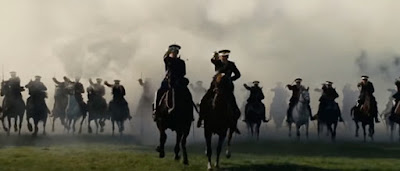or
"Come On, Joey! Come On!"The one-two punch of two Spielberg movies opening within a week of each is almost an embarrassment of riches, and in going from Tintin to War Horse it's a journey from the ridiculous to the sublime. We've seen what happens when Spielberg tries to make a Kubrick film (A.I.: Artificial Intelligence), a David Lean film (Empire of the Sun) or cut up like Hitchcock (Jaws), but what happens when he makes a John Ford film?
The answer is War Horse, based on the 1982 children's book by Michael Morpurgo, which was subsequently staged as a play adapted by Nick Stafford at London's National theater. Somewhere on this journey, Spielberg got wind of it, and the tale of World War I told from a horse's point of view became Spielberg's second Christmas release. Horse movies have all the sentimental elements of fables, which is why children love them, but the circumstances of this one have little to do with childhood concerns, but have more to do with kinship between man and beast in an unsentimental, often brutal world of adults.
It has all the elements of Ford: the Irish flavor as it begins in Devon, with the Narracott family acquiring a noble, unbreakable horse for plowing their hard-scrabble field; the horse—named Joey—learning to trust its first master, young Albert (Jeremy Irvine); the family being threatened with eviction by an uncaring bank (personified by David Thewlis' examiner); the "it takes a village" atmosphere that Ford engendered in his films (and not necessarily to come together in a common purpose, so much as to comment and gossip on it); the low comedy relief of animals—Spielberg makes goofy use of a particularly belligerent farm-goose and Ford favored horses that acted against training and merely acted like horses. Even the town of Devon looks precisely like the 20th Century Fox back-lot recreation of the Welsh mining town in Ford's How Green Was My Valley.
But tough economics trumps sentimentality here and the horse is sold into service in WWI to keep the family going, and The Great War passes the horse from hand to surviving hand, some gentle, some harsh as the battles change the landscapes and fortunes of those in the European theater. The war goes from planned charges to muddy trench warfare, Spielberg opens it up with a spirited run where, Joey, alone and ownerless for the first time in the film, makes a desperate gallop for freedom (something possibly learned by a former caretaker), through, over and past the soldiers huddled in the trenches and ironically ending his gallop in the middle of No Man's Land, where warring parties must watch and wonder at the sight between them that has nothing to do with the concerns of Man.
But, where War Horse most resembles Ford's work is pictorially—Spielberg sticks to close shots for moments of drama, but when he opens up, it calls to mind advice that the old Commander gave the young director when he was still dreaming of making movies (see video below). He's definitely paying attention to the horizon in this one, and the film, especially in its final moments, seems to come from a different era, one more rich in design and purpose.
In its color, both in sentiment and photographically, War Horse hearkens back to another period of cinema, one that was simpler and more direct, but it never betrays anything less than sophistication of subject matter and maturity of purpose, while still maintaining a high level of entertainment value. At this point in his career, Spielberg is presenting a master class in film-making, evoking the past when it suits him, but maintaining a personal growth that seems to never flag.

































